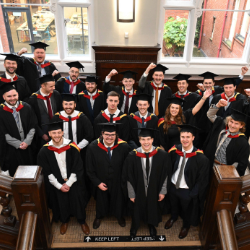-
Study
-
Quick Links
- Open Days & Events
- Real-World Learning
- Unlock Your Potential
- Tuition Fees, Funding & Scholarships
- Real World Learning
-
Undergraduate
- Application Guides
- UCAS Exhibitions
- Extended Degrees
- School & College Outreach
- Information for Parents
-
Postgraduate
- Application Guide
- Postgraduate Research Degrees
- Flexible Learning
- Change Direction
- Register your Interest
-
Student Life
- Students' Union
- The Hub - Student Blog
- Accommodation
- Northumbria Sport
- Support for Students
-
Learning Experience
- Real-World Learning
- Research-enriched learning
- Graduate Futures
- The Business Clinic
- Study Abroad
-
-
International
International
Northumbria’s global footprint touches every continent across the world, through our global partnerships across 17 institutions in 10 countries, to our 277,000 strong alumni community and 150 recruitment partners – we prepare our students for the challenges of tomorrow. Discover more about how to join Northumbria’s global family or our partnerships.
View our Global Footprint-
Quick Links
- Course Search
- Undergraduate Study
- Postgraduate Study
- Information for Parents
- London Campus
- Northumbria Pathway
- Cost of Living
- Sign up for Information
-
International Students
- Information for International Students
- Northumbria and your Country
- International Events
- Application Guide
- Entry Requirements and Education Country Agents
- Global Offices
- English Requirements
- English Language Centre
- International student support
- Cost of Living
-
International Fees and Funding
- International Undergraduate Fees
- International Undergraduate Funding
- International Masters Fees
- International Masters Funding
- International Postgraduate Research Fees
- International Postgraduate Research Funding
- Useful Financial Information
-
International Partners
- Agent and Representatives Network
- Global Partnerships
- Global Community
-
International Mobility
- Study Abroad
- Information for Incoming Exchange Students
-
-
Business
Business
The world is changing faster than ever before. The future is there to be won by organisations who find ways to turn today's possibilities into tomorrows competitive edge. In a connected world, collaboration can be the key to success.
More on our Business Services-
Business Quick Links
- Contact Us
- Business Events
- Research and Consultancy
- Education and Training
- Workforce Development Courses
- Join our mailing list
-
Education and Training
- Higher and Degree Apprenticeships
- Continuing Professional Development
- Apprenticeship Fees & Funding
- Apprenticeship FAQs
- How to Develop an Apprentice
- Apprenticeship Vacancies
- Enquire Now
-
Research and Consultancy
- Space
- Energy
- AI and Tech
- CHASE: Centre for Health and Social Equity
- NESST
-
-
Research
Research
Northumbria is a research-rich, business-focused, professional university with a global reputation for academic quality. We conduct ground-breaking research that is responsive to the science & technology, health & well being, economic and social and arts & cultural needs for the communities
Discover more about our Research-
Quick Links
- Research Peaks of Excellence
- Academic Departments
- Research Staff
- Postgraduate Research Studentships
- Research Events
-
Research at Northumbria
- Interdisciplinary Research Themes
- Research Impact
- REF
- Partners and Collaborators
-
Support for Researchers
- Research and Innovation Services Staff
- Researcher Development and Training
- Ethics, Integrity, and Trusted Research
- University Library
- Vice Chancellors Fellows
-
Research Degrees
- Postgraduate Research Overview
- Doctoral Training Partnerships and Centres
- Academic Departments
-
Research Culture
- Research Culture
- Research Culture Action Plan
- Concordats and Commitments
-
-
About Us
-
About Northumbria
- Our Strategy
- Our Staff
- Our Schools
- Place and Partnerships
- Leadership & Governance
- University Services
- Northumbria History
- Contact us
- Online Shop
-
-
Alumni
Alumni
Northumbria University is renowned for the calibre of its business-ready graduates. Our alumni network has over 253,000 graduates based in 178 countries worldwide in a range of sectors, our alumni are making a real impact on the world.
Our Alumni - Work For Us
What will I learn on this module?
This module aims to provide you with thorough understanding and knowledge of existing and new concepts and technologies in electrical power engineering, and apply the knowledges on design and industrial applications of power electronics and electric motor drives. You will cover the principles of advanced control techniques as applied to these systems. The module is specifically concerned with the following subjects: power electronics devices and conventional converter topologies; pulse-width-modulation (PWM) techniques; state of the art practical switching power converters; power quality and harmonic analysis of various power conversion systems; power electronics control of renewable energy sources including solar, wind, and fuel-cell energy systems as well as electric and hybrid vehicles; electric machines and drives fundamentals; space-vector theory, control and applications of DC and AC drives; vector and field-oriented control of high performance induction and synchronous motor drives; applications and efficiency of electric drives; regulations, standards and other professional issues.
How will I learn on this module?
Lectures will be the main delivery mechanism, during which you will explore analytical and design procedures of power electronics and drive systems. Directed learning will be used in conjunction with the lectures to guide you to specific topics or chapters in the lecture notes or towards texts in the indicative reading list. Seminars and laboratory sessions will be provided to reinforce theory, which will serve as a platform for you to receive formative feedback and facilitate to solve engineering-oriented problems in power electronics and drive systems.
How will I be supported academically on this module?
All taught materials are made available to you via the eLearning portal. These will include course work, lecture notes, seminar exercises, pre-recorded videosand references to other supporting resources for additional reading such as relevant journal and conference papers or any other research informed publications and multimedia related to the module content. If further clarifications are required, you are encouraged to contact the module team directly during lectures, seminars or laboratory sessions or outside of the teaching hours by email in the first instance.
The knowledge acquired in this module significantly increases the employability in the field of power electronics and ac and dc drives.
What will I be expected to read on this module?
All modules at Northumbria include a range of reading materials that students are expected to engage with. Online reading lists (provided after enrolment) give you access to your reading material for your modules. The Library works in partnership with your module tutors to ensure you have access to the material that you need.
What will I be expected to achieve?
Knowledge & Understanding:
1. Demonstrate the knowledge and understanding of the essential scientific concepts and principles of modelling, operation and control of different electric machines and power electronics converters, and the ability to apply this in the design of power electronics and electric drive systems. (AHEP4: M1, M3)
2. Apply the knowledge to systematically identify and analyse complex problems in power electronics and electric drive systems .
(AHEP4: M1))
Intellectual / Professional skills & abilities:
3. Design a realistic dynamic models for computer simulations of power electronics control of an industrial AC motor using appropriate software packages, and effectively address the methods and results in writing and presentation (AHEP4: M3, M12, M17).
4. Investigate, evaluate and adopt control strategies and design procedures for implementation, develop the entire simulation model, and then conduct a preliminary performance analysis of the considered drive system from the obtained simulation results.
(AHEP4: M1-33, M12))
Personal Values Attributes
5.Contribute to the team to analyse complex circuits, and present own ideas and analyses effectively.
(AHEP4: M16)
How will I be assessed?
There are two forms of summative assessment:
SUMMATIVE ASSESSMENT
1. .Coursework (CW): (50%) – (2000 words). This addresses module learning outcomes 1-4. This will be a workshop- based report on power electronics techniques. This assessment will assess the student’s ability to apply and demonstrate understanding of the power electronics techniques introduced via the lectures and workshop to solve a range of engineering-oriented problems. A video presentation from students is also assessed on the individual ability and understanding. The individual feedback is provided on the student’s report, and the student can access to his/her own feedback via the elp.
2. .Coursework (CW): (50%)(2000 words).
This will address module learning outcomes 1-4. This will be a workshop- based report on electric drive techniques. This assessment will assess the student’s ability to apply and demonstrate understanding of the electric drive techniques introduced via the lectures and workshop to solve a range of engineering-oriented problems. A video presentation from students is also assessed on the individual ability and understanding. The individual feedback is provided on the student’s report, and the student can access to his/her own feedback via the elp.
FORMATIVE ASSESSMENT
Laboratories – module learning outcomes addressed: 3, 4
Class group discussions- module learning outcomes addressed: 5
Verbal feedback will be provided on formative assessment during respective contact sessions.
Pre-requisite(s)
N/A
Co-requisite(s)
N/A
Module abstract
This module will deliver you substantial materials on power converters and electric drive systems. The active teaching and learning in lectures and tutorials will benefit you to grasp the essential knowledge on semi-conductor devices, types of power converters, operation theory of various power converters, and advanced control techniques of electric drive systems. The workshops on power conversion circuits and drive system simulations will enhance your skills for solving engineering-oriented problems. You will be assessed by the lab-based coursework and the feedbacks will be provided to you after the assessments. The learning of the module will benefit you to equip with necessary knowledge and skills for the future employments in electrical and energy industries.
Course info
Credits 20
Level of Study Postgraduate
Mode of Study 2 years Full Time (with Advanced Practice in the second year)
2 other options available
School Engineering, Physics and Mathematics
Location City Campus, Northumbria University
City Newcastle
Start September
All information is accurate at the time of sharing.
Full time Courses are primarily delivered via on-campus face to face learning but could include elements of online learning. Most courses run as planned and as promoted on our website and via our marketing materials, but if there are any substantial changes (as determined by the Competition and Markets Authority) to a course or there is the potential that course may be withdrawn, we will notify all affected applicants as soon as possible with advice and guidance regarding their options. It is also important to be aware that optional modules listed on course pages may be subject to change depending on uptake numbers each year.
Contact time is subject to increase or decrease in line with possible restrictions imposed by the government or the University in the interest of maintaining the health and safety and wellbeing of students, staff, and visitors if this is deemed necessary in future.
Useful Links
Find out about our distinctive approach at
www.northumbria.ac.uk/exp
Admissions Terms and Conditions
northumbria.ac.uk/terms
Fees and Funding
northumbria.ac.uk/fees
Admissions Policy
northumbria.ac.uk/adpolicy
Admissions Complaints Policy
northumbria.ac.uk/complaints










